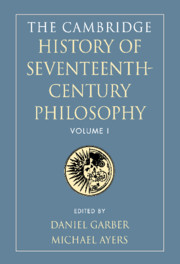Book contents
- Frontmatter
- Introduction
- I The context of seventeenth-century philosophy
- II Logic, language, and abstract objects
- III God
- 10 The idea of God
- 11 Proofs of the existence of God
- 12 The Cartesian dialectic of creation
- 13 The relation between theology and philosophy
- 14 The religious background of seventeenth-century philosophy
- IV Body and the physical world
- V Spirit
- Bibliographical appendix
- Bibliography
- References
14 - The religious background of seventeenth-century philosophy
from III - God
Published online by Cambridge University Press: 28 March 2008
- Frontmatter
- Introduction
- I The context of seventeenth-century philosophy
- II Logic, language, and abstract objects
- III God
- 10 The idea of God
- 11 Proofs of the existence of God
- 12 The Cartesian dialectic of creation
- 13 The relation between theology and philosophy
- 14 The religious background of seventeenth-century philosophy
- IV Body and the physical world
- V Spirit
- Bibliographical appendix
- Bibliography
- References
Summary
INTRODUCTION
The philosophy of the seventeenth century has often been seen as connected with a gradual march from religious orthodoxy and oppression towards pre-Enlightenment deism, agnosticism, atheism, and toleration. In reality, though, the world of seventeenth-century religious thought is much more complicated than this simple schema would suggest. To be sure, there is a strain of religious thought that appears to lead directly to the Enlightenment. However, there is a great deal more: widespread religious movements that are quite different in character, an undercurrent of interconnected religious ideas and developments which may now look strange and distant from philosophy but were familiar to, and were taken seriously by, all the major philosophers of the period. These philosophers lived in societies dominated by religious institutions and lived through tremendous upheavals that were fundamentally generated out of religious concerns – the Reformation, the Counter-Reformation, the Thirty Years' War, the Puritan Revolution, the pogroms in Poland, the revocation of the Edict of Nantes. The point is not simply that religious ideas and events had an important influence on the philosophical thought of the period. Rather, these religious issues were deeply intertwined with philosophical conceptions of knowledge, revelation, the importance of scientific inquiry, human nature, and what it is to be reasonable. This meant, among other things, that philosophical positions had serious consequences that went far beyond the classroom, academy, or salon, as the cases of Galileo, Bruno, and Vanini show in different ways.
- Type
- Chapter
- Information
- The Cambridge History of Seventeenth-Century Philosophy , pp. 393 - 422Publisher: Cambridge University PressPrint publication year: 2000



